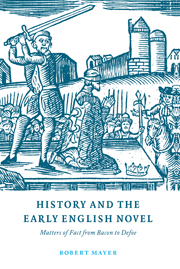Book contents
- Frontmatter
- Contents
- List of illustrations
- Acknowledgments
- Introduction
- 1 Baconian historiography: the contours of historical discourse in seventeenth-century England
- 2 “Idle Trash” or “Reliques of Somthing True”?: the fate of Brut and Arthur and the power of tradition
- 3 The History of Myddle: memory, history, and power
- 4 Lifewriting and historiography, fiction and fact: Baxter, Clarendon, and Hutchinson on the English Civil War
- 5 The secret history of the last Stuart kings
- 6 “Knowing strange things”: historical discourse in the century before Robinson Crusoe
- 7 “History” before Defoe: Nashe, Deloney, Behn, Manley
- 8 Defoe's historical practice: from “The Ages Humble Servant” to Major Alexander Ramkins
- 9 “Facts that are form'd to touch the mind”: Defoe's narratives as forms of historical discourse
- 10 From history to the novel: the reception of Defoe
- Conclusion
- Index
- CAMBRIDGE STUDIES IN EIGHTEENTH-CENTURY ENGLISH LITERATURE AND THOUGHT
10 - From history to the novel: the reception of Defoe
Published online by Cambridge University Press: 31 October 2009
- Frontmatter
- Contents
- List of illustrations
- Acknowledgments
- Introduction
- 1 Baconian historiography: the contours of historical discourse in seventeenth-century England
- 2 “Idle Trash” or “Reliques of Somthing True”?: the fate of Brut and Arthur and the power of tradition
- 3 The History of Myddle: memory, history, and power
- 4 Lifewriting and historiography, fiction and fact: Baxter, Clarendon, and Hutchinson on the English Civil War
- 5 The secret history of the last Stuart kings
- 6 “Knowing strange things”: historical discourse in the century before Robinson Crusoe
- 7 “History” before Defoe: Nashe, Deloney, Behn, Manley
- 8 Defoe's historical practice: from “The Ages Humble Servant” to Major Alexander Ramkins
- 9 “Facts that are form'd to touch the mind”: Defoe's narratives as forms of historical discourse
- 10 From history to the novel: the reception of Defoe
- Conclusion
- Index
- CAMBRIDGE STUDIES IN EIGHTEENTH-CENTURY ENGLISH LITERATURE AND THOUGHT
Summary
We have seen that the narratives of Defoe that have come to be regarded as novels were presented to readers as histories and were often initially read as such. Yet by the end of the eighteenth century Robinson Crusoe, Moll Flanders, A Journal of the Plague year, and the other “novels” had been issued under Defoe's name, and works by Anna Laetitia Barbauld, James Beattie, and Sir Walter Scott around the turn of the eighteenth century identified Defoe as a novelist and assigned at least some of his most important texts to the canon of English novels. This process was far from smooth, however; Scott initially left Defoe out of his Lives of the Novelists, and there was no entry on Defoe in John Dunlop's groundbreaking History of Fiction (1814). Still, as the nineteenth century proceeded, important studies of Defoe as a novelist by the likes of Charles Lamb, Walter Wilson, William Hazlitt, and Leslie Stephen appeared. What is surprising about all this commentary, however, is that it did not really settle what A. W. Secord would later label “the Defoe problem” – the question of how fact and fiction are related in his narratives – nor did it satisfactorily clarify the matter of what generic classification was appropriate for his major texts.
Uncertainty about Defoe has continued to our own day. It seems that if historians and theoreticians of the English novel cannot live without Defoe, they cannot live very comfortably with him either.
- Type
- Chapter
- Information
- History and the Early English NovelMatters of Fact from Bacon to Defoe, pp. 207 - 226Publisher: Cambridge University PressPrint publication year: 1997



